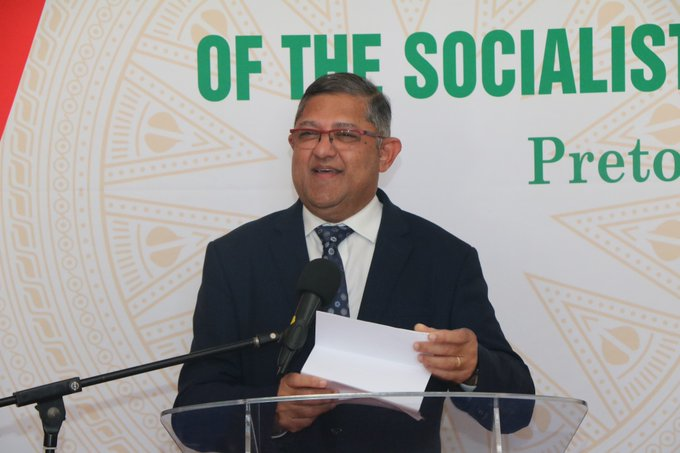SA Expands Agricultural Trade, Eyes Stronger Ties with Vietnam and ASEAN
“We’ve made significant progress in opening up vast new markets and securing vital protocols for products like citrus and others,” Singh stated.

- Country:
- South Africa
As global trade faces mounting uncertainties, South Africa is taking bold steps to future-proof its agricultural economy by opening new markets and strengthening strategic partnerships. This was the key message delivered by Deputy Minister of Forestry, Fisheries and the Environment, Narend Singh, during his address at the 80th Independence Day celebration of the Socialist Republic of Vietnam, held in Pretoria on Tuesday.
Deputy Minister Singh emphasised that South Africa is not simply reacting to global pressures but is proactively and collaboratively reshaping its trade portfolio to align with the evolving global landscape. This includes diversification of agricultural exports, deeper regional integration, and greater cooperation with dynamic economies in Asia and the Middle East.
“We’ve made significant progress in opening up vast new markets and securing vital protocols for products like citrus and others,” Singh stated. “We are confidently expanding our reach and creating new opportunities for our agricultural producers.”
Diversifying Agricultural Trade: A Strategic Imperative
Under the coordinated leadership of the Presidency, the South African government is advancing a comprehensive trade diversification agenda. This involves:
-
Expanding into high-growth markets in Asia and the Middle East
-
Retaining and strengthening existing key markets, such as the European Union and the United States
-
Accelerating the implementation of the African Continental Free Trade Area (AfCFTA)
-
Tapping into new regional markets such as the Association of Southeast Asian Nations (ASEAN)
These moves are part of a broader strategic shift to reduce dependency on traditional trade partners and increase resilience against global economic shocks, such as supply chain disruptions, protectionism, and geopolitical instability.
“While the current global economic environment presents challenges, it also presents opportunities to build and accelerate the implementation of the AfCFTA, and to develop new partnerships in markets that have remained untapped,” Singh explained.
Vietnam-South Africa Relations: Unlocking Shared Potential
Singh’s address highlighted the longstanding and growing relationship between South Africa and Vietnam, with both nations sharing historical solidarity and a commitment to peace, development, and economic progress. He called for a deepening of bilateral cooperation, especially in agriculture, environmental sustainability, trade, and technology.
“It is essential that Vietnam and South Africa explore concrete ways to deepen collaboration—through joint ventures, knowledge exchange, or policy alignment—to ensure shared progress that translates into tangible benefits for our citizens,” Singh stated.
South Africa’s agricultural strengths in citrus, wine, nuts, grains, and livestock, combined with Vietnam’s expertise in aquaculture, rice, and technology, present complementary opportunities for trade and technical collaboration.
Broader Geopolitical Context: A Call for Multilateral Cooperation
Singh also touched on the current global context marked by heightened geopolitical tensions, trade fragmentation, and socio-economic disparities. In this environment, he emphasised the need for international solidarity and cooperation—not only to address bilateral concerns but to promote peace and prosperity across regions.
“The international community faces a complex array of challenges—geopolitical tensions, economic inequality, trade uncertainties, social unrest, and human rights concerns,” Singh warned. “It is the hope of my government that we will continue to work to deepen our relationship and learn from each other's experiences.”
The Deputy Minister reiterated South Africa’s support for inclusive multilateralism, underscoring the role of developing nations—especially those in the Global South—in redefining trade rules, environmental cooperation, and equitable development frameworks.
Strategic Trade Wins: Citrus and Beyond
South Africa has already recorded notable wins in securing new protocols for high-demand agricultural products. Citrus, in particular, has become a flagship export commodity, now penetrating deeper into markets such as China, India, Bangladesh, and the UAE. The government is also pursuing new sanitary and phytosanitary agreements to facilitate the export of macadamia nuts, avocados, wine, and table grapes.
These market access gains are supported by ongoing investments in port efficiency, cold chain logistics, and compliance with international standards—critical for maintaining export competitiveness.
The Road Ahead: Sustainability, Growth, and Innovation
As South Africa expands its global agricultural footprint, the Deputy Minister emphasised that the country remains committed to sustainable trade and climate-smart agricultural practices, aligning its trade objectives with environmental and social imperatives.
He noted that international partnerships—such as those with Vietnam and ASEAN members—offer opportunities not just for market access, but also for:
-
Technology transfer in climate-resilient farming
-
Joint research and innovation hubs
-
Capacity building and skills development for young farmers and agribusiness professionals
-
Environmental conservation and biodiversity protection
Final Thoughts: A Resilient, Connected Africa in a Changing World
Deputy Minister Singh’s address ultimately presented a vision of a more resilient, globally integrated South African agriculture sector, built on partnerships, innovation, and shared values. By embracing new trade frontiers while strengthening regional solidarity through frameworks like AfCFTA, South Africa is positioning itself as a key player in reshaping global trade dynamics from the Global South.
“We look forward to strengthening our partnership and working together to promote peace, prosperity, and development in our countries and in the regions we find ourselves in,” Singh concluded.










